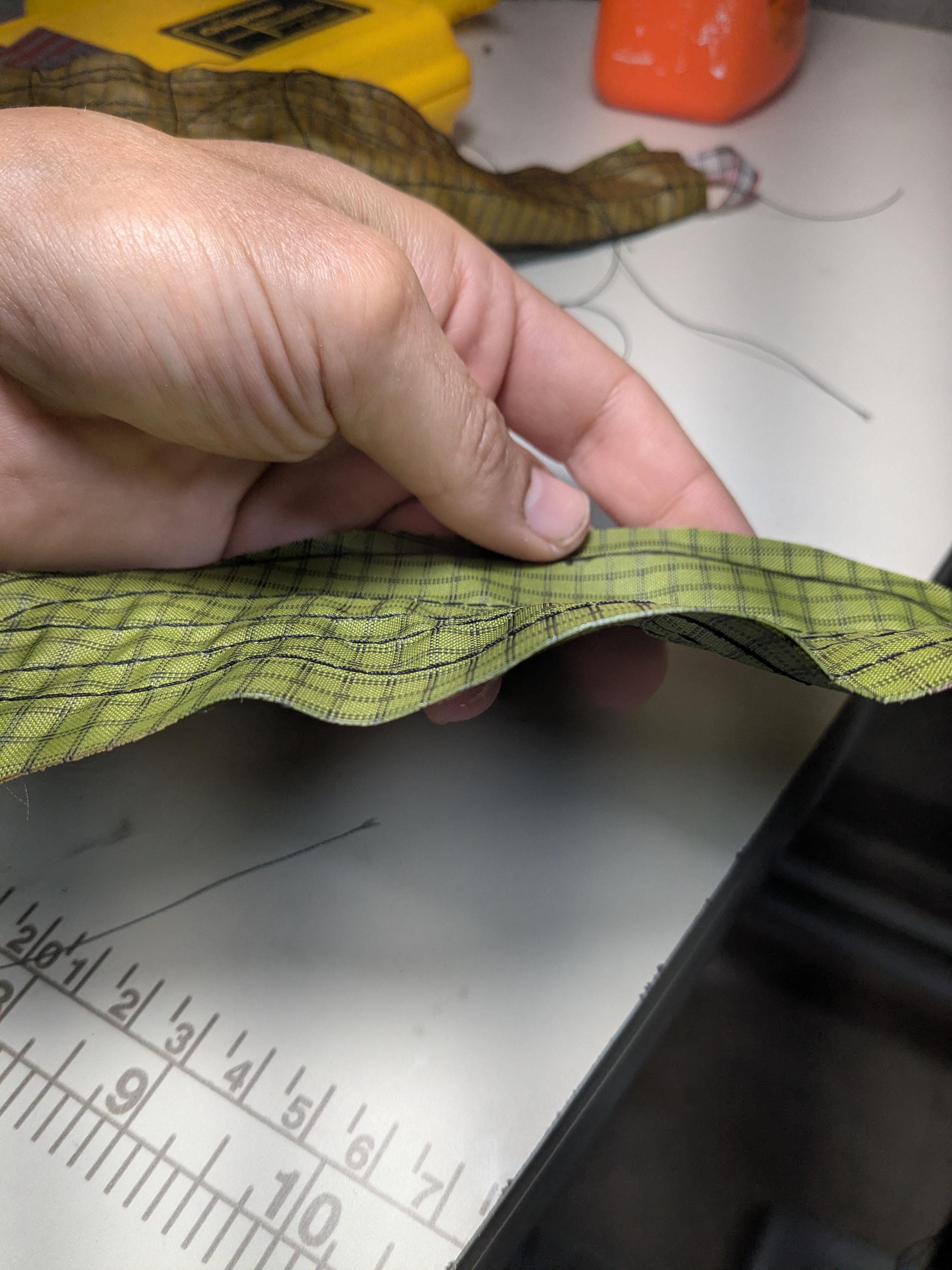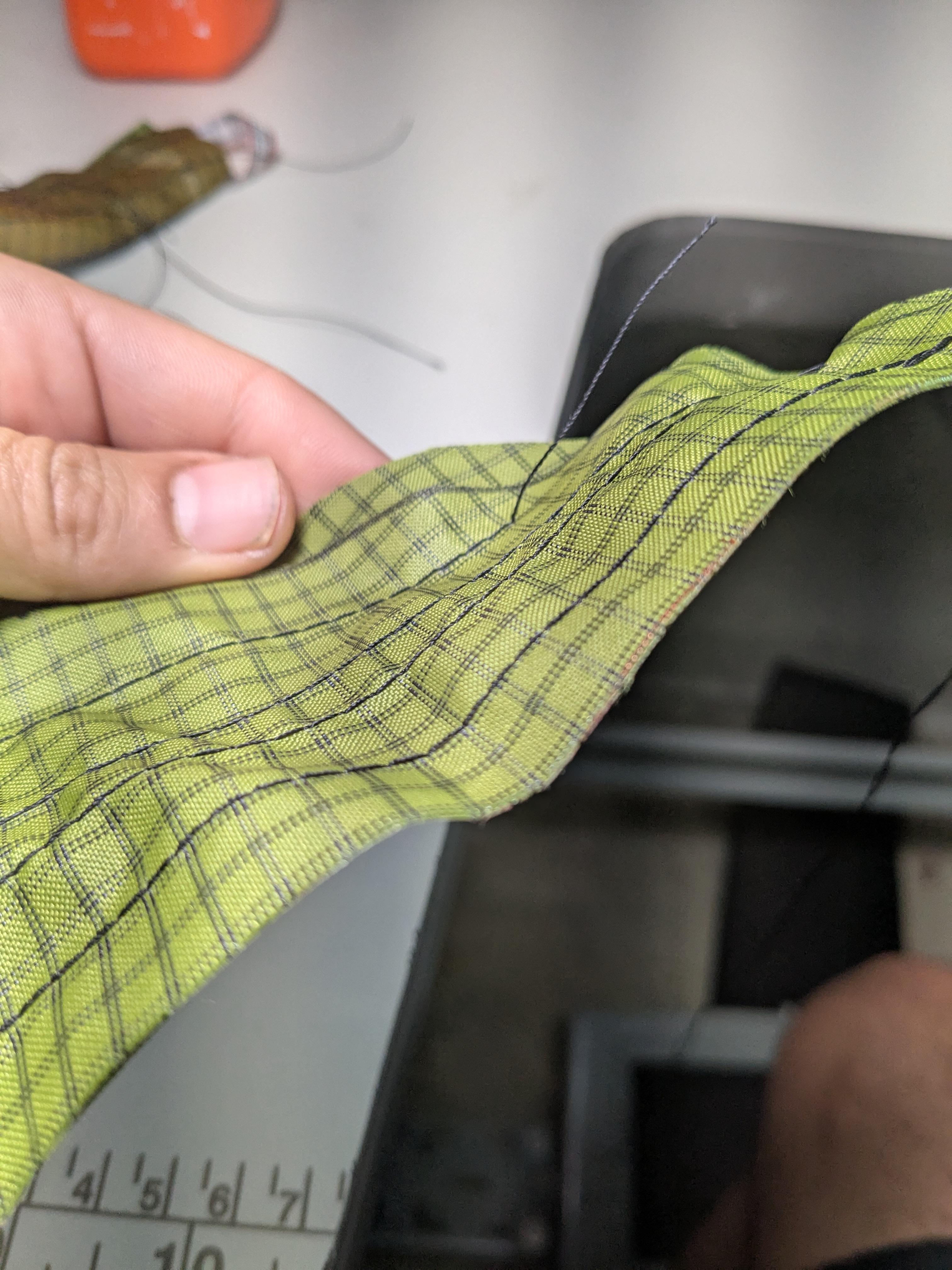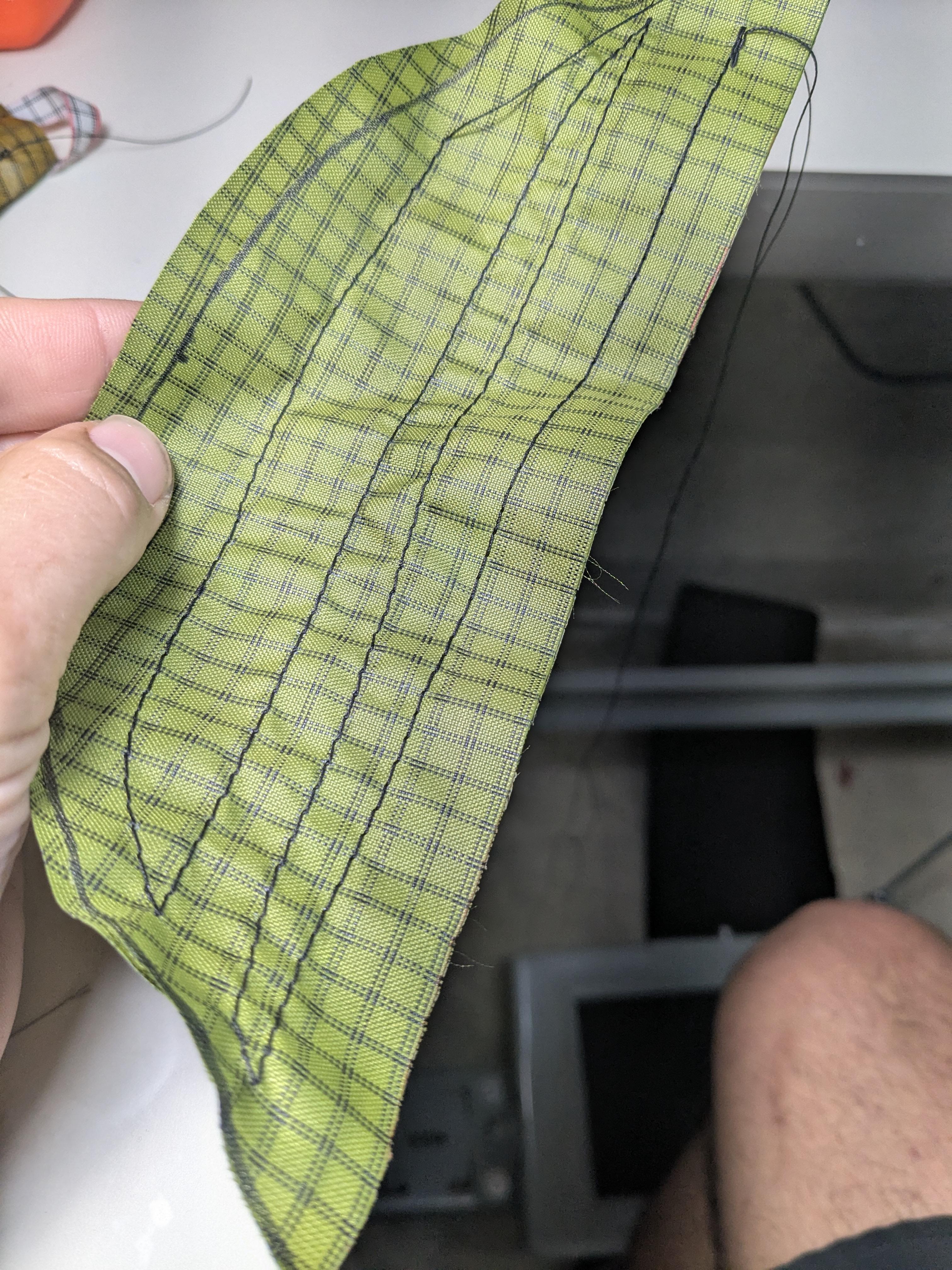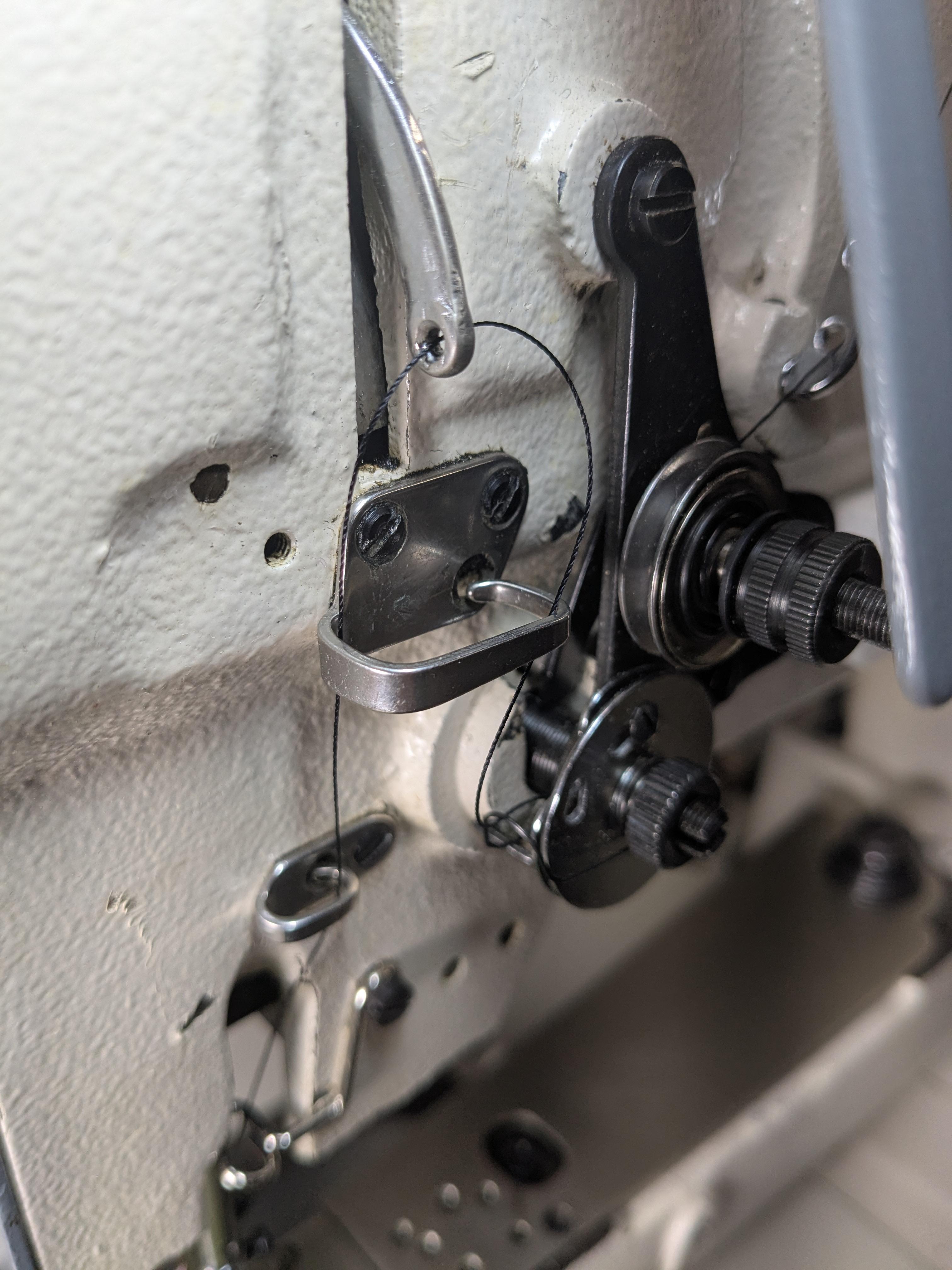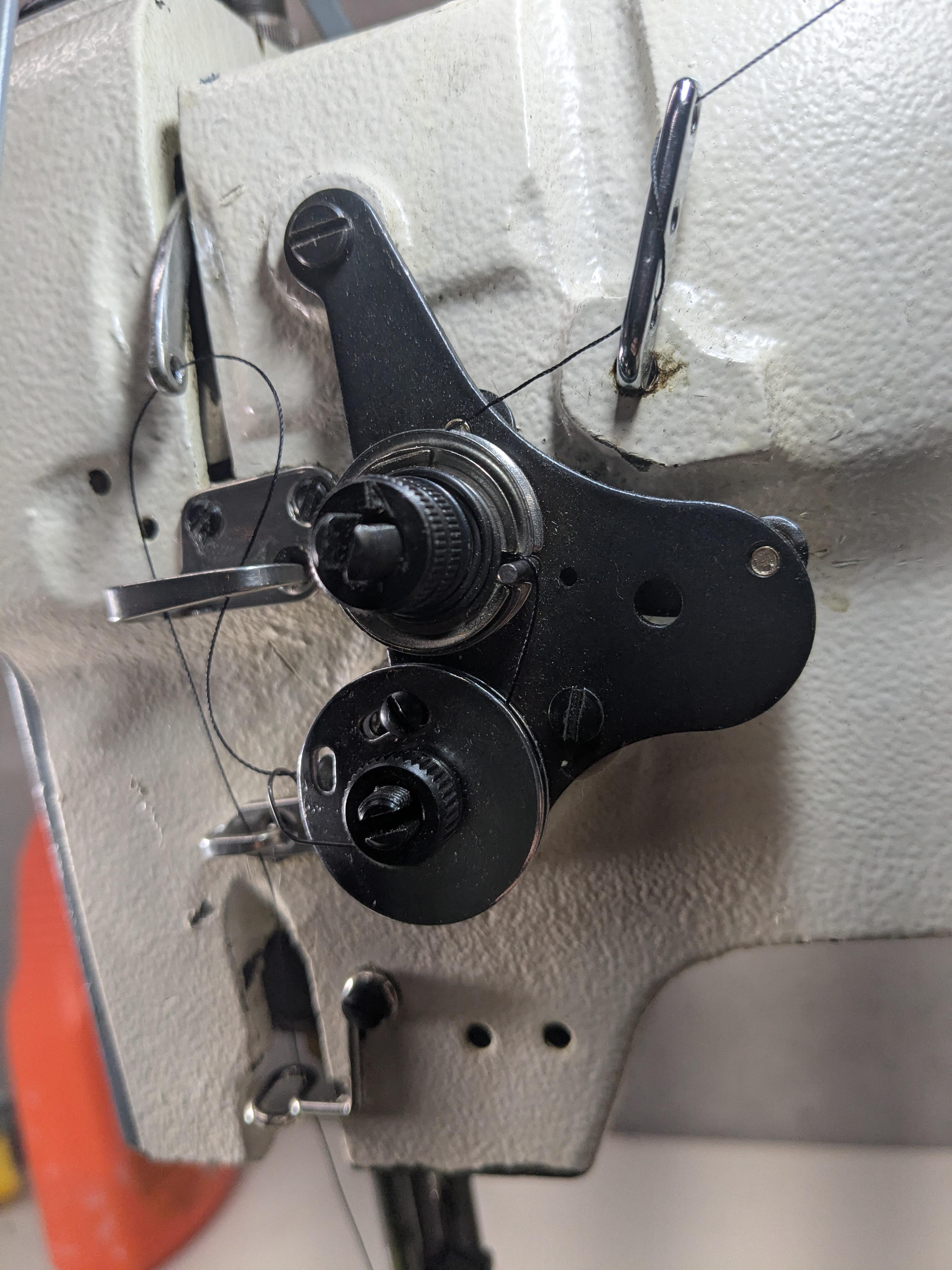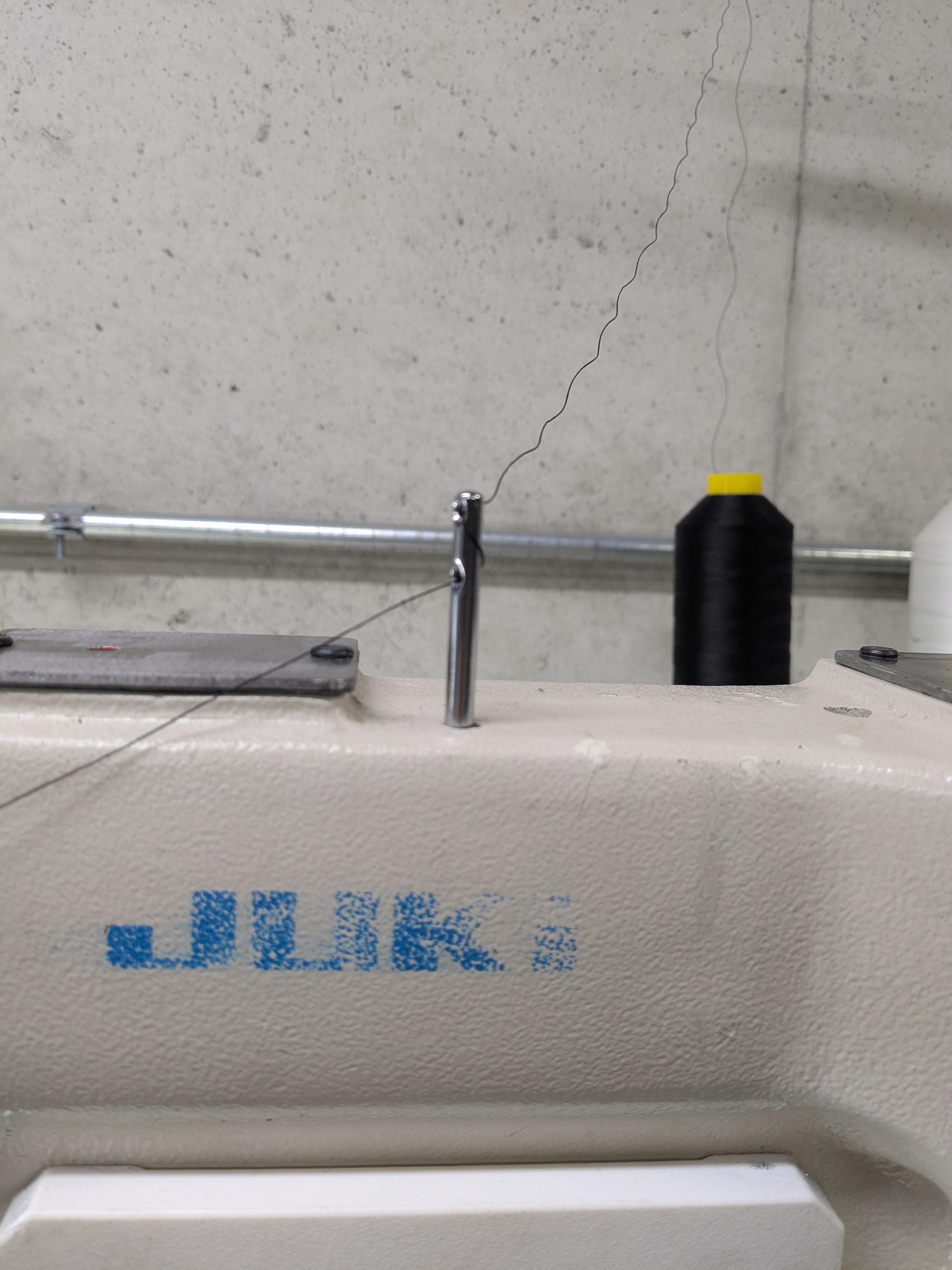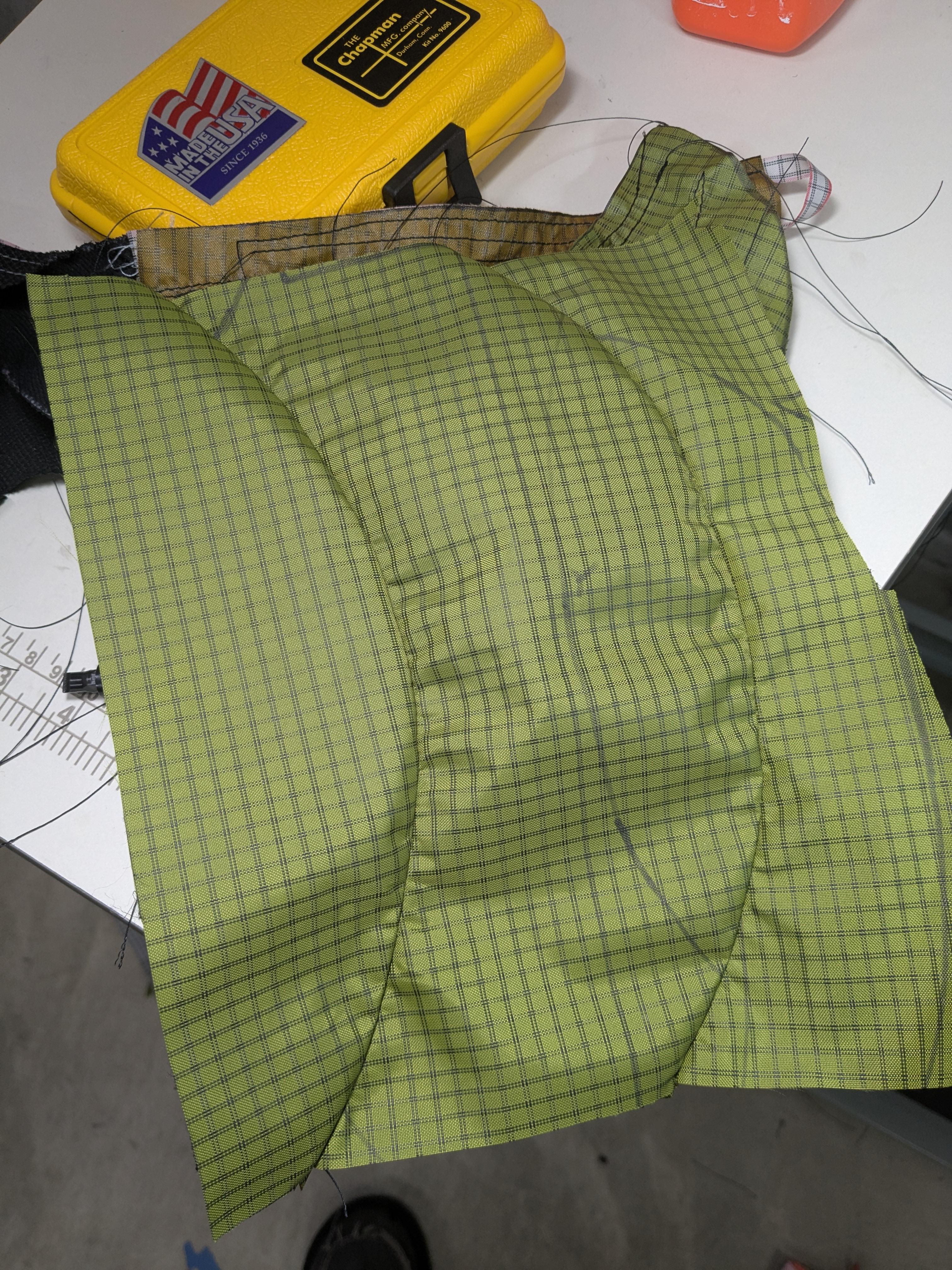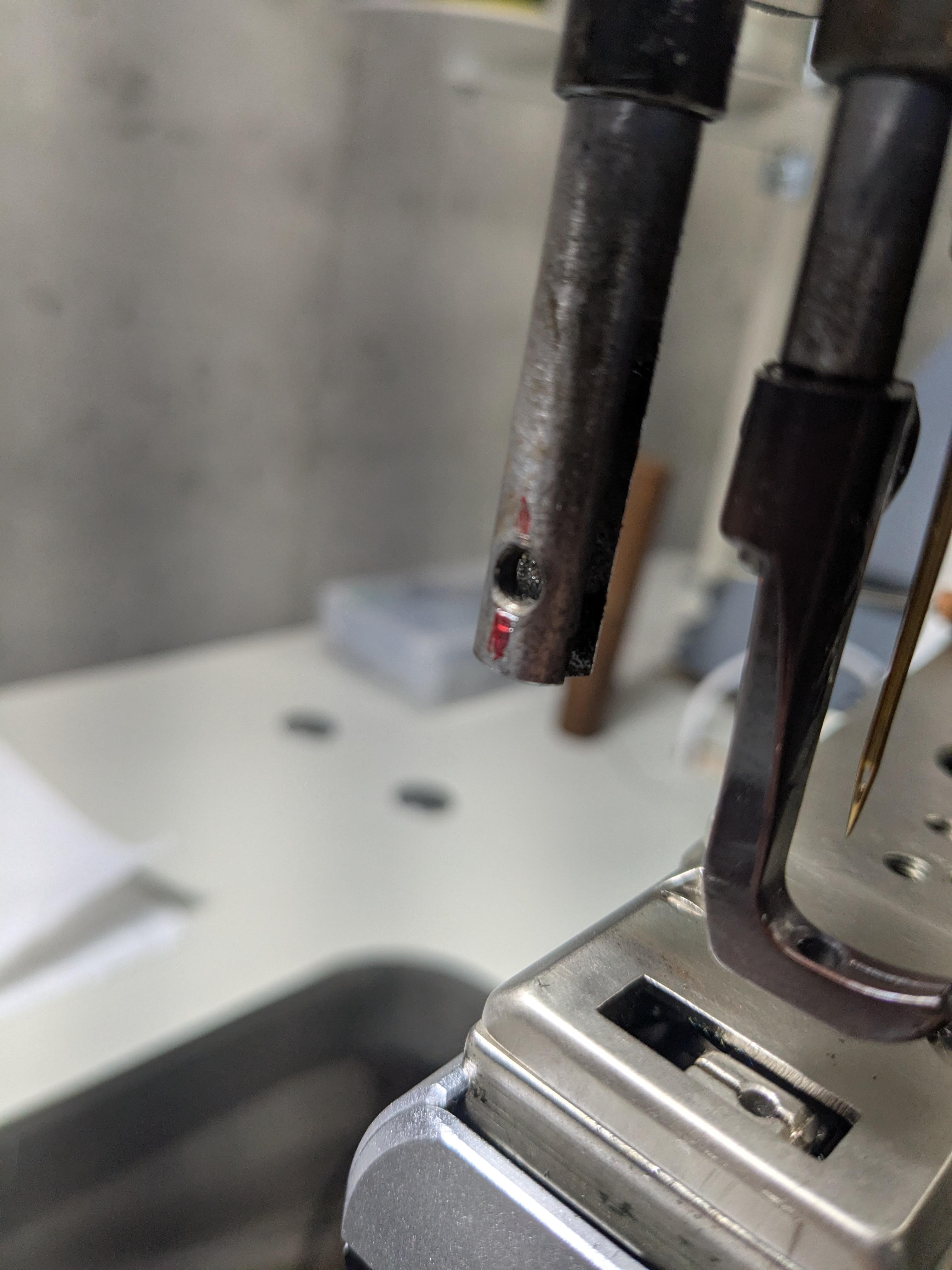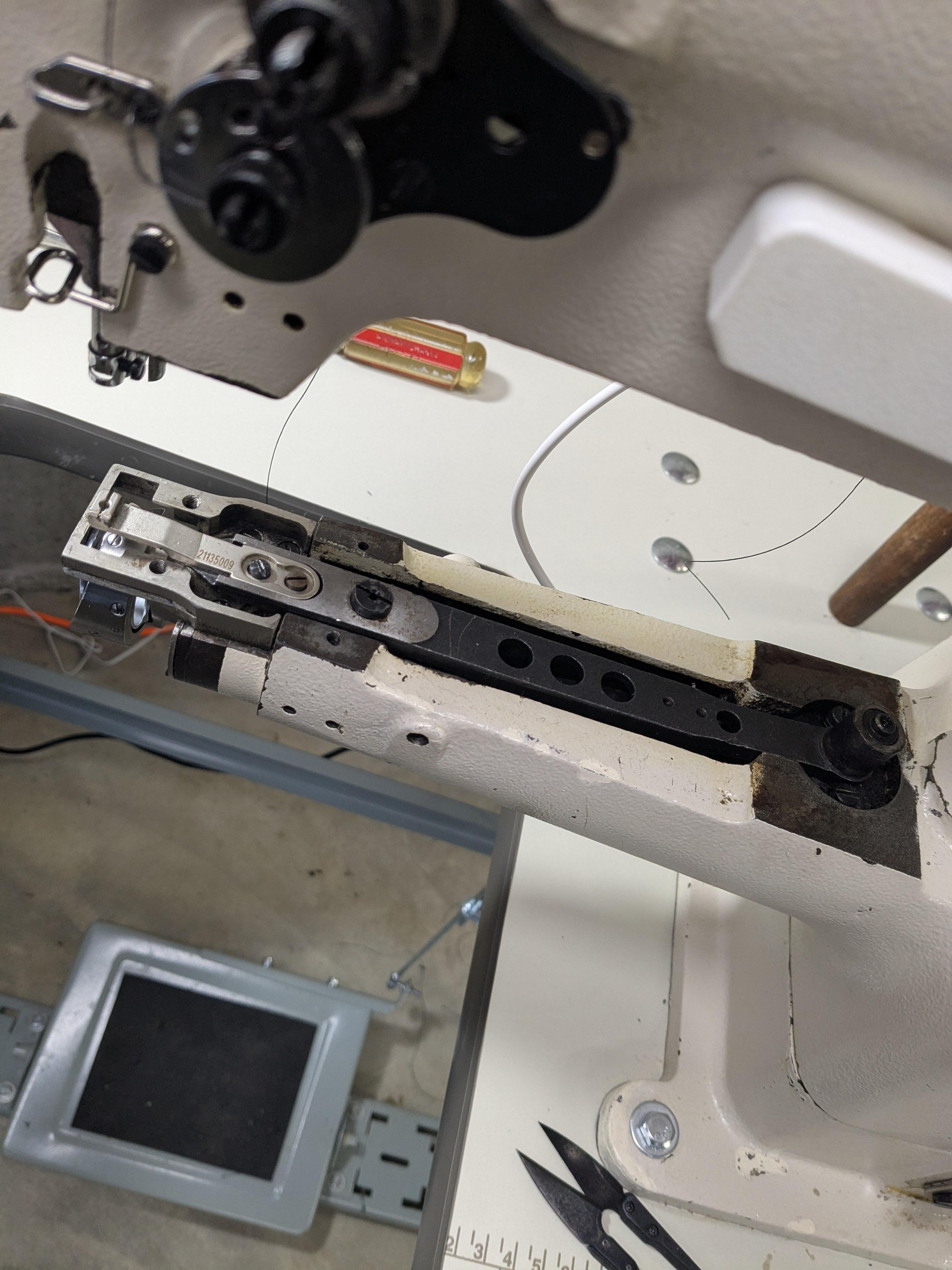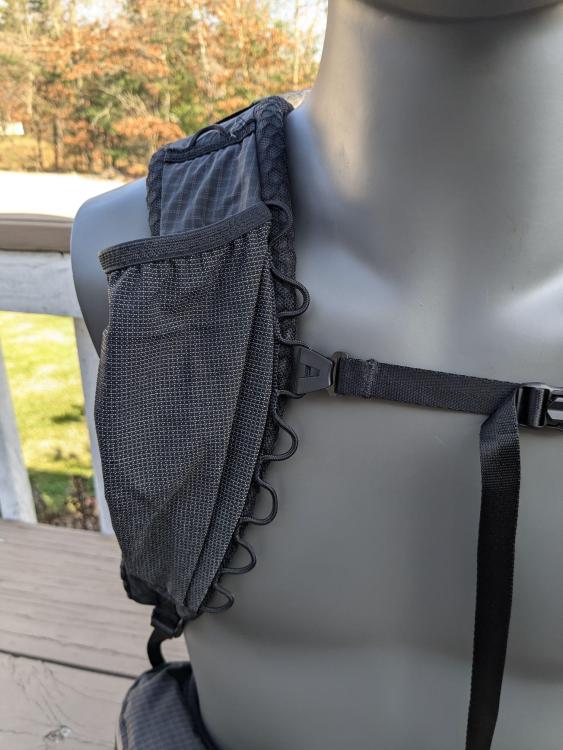
eblanche
Members-
Posts
33 -
Joined
-
Last visited
Content Type
Profiles
Forums
Events
Blogs
Gallery
Store
Everything posted by eblanche
-
Hi John, I also make backpacks and use a 246. To start, for perspective, I paid ~$2500 for my machine with table, servo w/ needle positioner, and a couple other items towards the beginning of 2025. This was with a local guy. These are not too common, Unft. I did not pay for shipping but the fella who found the machine for me in PA did replace a few parts including the hook with Genuine Juki parts. This was a newer style 246, not the older style as is the one you are currently looking at. I can confirm it can easily handle 14 needle and v46 thread. With the fabric you tend to use, you will have no problems even with just two layers but IMO two layers of ~150-210d is about the min I think it could easily handle unless you spend the BIG BUCKS for the extra small needle hole JUKI feed dogs. The 246, when not setup as synchronized binder, uses an elliptical style feed dog (NOT just back and forth) but more an oval shape. As synchronized binder it is simple back and forth motion of the feed dog. I believe the 1341 has the advantage of using a "four-motion" rectangular feed dog for slightly better control of bottom fabric though the needle cycle. On the 246, if you wanted to switch between regular sewing and synchronized binder, it is only a matter of 10min to swap all parts. If you use non-genuine juki parts, the swap is very much a reasonable cost. The pictured 246-6 is missing an item or two at first glance and top cover of cylinder arm appears misaligned or bent upwards compared to the throat plate. Both parts are easily replaced. As mentioned, the pfaff 335 is similar but both the pfaff and the juki have many different sub classes of those 335/244/245/246 models. Last year, Gary at Forsewing had a number of used 245/246's. Nothing listed on his site right now but might be worth inquiring with him. LA based but it was only $300 for freight at the time of quote.
-
Review of Jianglong 341 after 4 months
eblanche replied to friquant's topic in Leather Sewing Machines
Well then, talk about a precise and usable reply! I'll see what that looks like, Sounds pretty solid. -
Review of Jianglong 341 after 4 months
eblanche replied to friquant's topic in Leather Sewing Machines
Okay great, thanks for the info! I know these are more just to hold your product rather than a table to lean on, but can you comment on the stability of the table when installed? Can you put a reasonable amount of weight on top (~2+lbs) without the table wobbling or tilting? I actually purchased and returned a different table top as I was not satisfied with the stability, I think due to the stock/standard install method. -
Review of Jianglong 341 after 4 months
eblanche replied to friquant's topic in Leather Sewing Machines
Hey Folks, I am currently in contact with a rep from JL about their acrylic/alum. table top attachment. I am looking for a table for my juki 246 rather than 341/1341 style but I wanted to ask about the overall quality of the table and the pieces, as well as the clearance to the cylinder arm and throat plates. This style looks to be somewhat common although I have not seen an acrylic version elsewhere. @friquant @Smiche @toxo Do either of you have any feedback for the table top attachment from JiangLong, if you received one? Thanks, any info will be helpful and appreciated! FYI, They are asking for $65 for the table as a separate purchase. Shipping to the the USA approx. the same cost, $65. Depending on duty/tariff, this may or may not be reasonable. I am still awaiting clarification if they handle those costs for US customers. (ugh prob not lol). -
What issues are you having with the machine?
-
Bobbin thread tension and thread color
eblanche replied to Gymnast's topic in Leather Sewing Machines
Would you kindly inquire with Amann about your results, if you have a contact? Curious if they may have a response on this, whether it be normal or unnormal. Thank you for providing these results! -
I've gone through this recently with raw edge 90* binders and it wasn't long before I realized the above to be all correct and very important. Also, practice (PRACTICE? we talkin' bout PRACTICE!?!) how you are feeding the material into the binder. I went through a lot of tape, material, and time before I figured things out. I worked with a few different over the counter binders and ended up modifying my binding foot, throat plate, AND binder brackets to get my desired results. Now it works every time on smaller radius curves. This is with a synchronized Juki 246 cylinder arm.
-
I have been using the basic "sewing machine" set from Chapman Mfg. Good stuff but I do not have much experience with other quality tools. The small hand ratchet, and thumb spinner have made themselves very useful; especially with feed dogs and throat plates. All the other posters are correct though, it is important to match the sizes and having a non-tapered head also helps. https://chapmanmfg.com/pages/bits-that-dont-screw-up
-
Okay thanks! this is Amann strongbond v69. Not exactly inexpensive but willing to try others. Does the video work for anyone else?
-
Thanks KGG, I should also mention: A. I have adjusted second thread guide in different positions. I'll reposition to original as per Manuel. B. When threading the tension assembly to NOT go up and over the pin, the thread often becomes disengaged from the top tension discs, releasing tension altogether. Maybe there are multiple issues...? I used the pin as suggested in a video for a different type of machine using the same type tension assembly. Materials: yes dually noted! This machine specs suggest lighter thread/needle can be used. Idk if that directly relates to the exact types of materials. I know of many using the 1541 and similar compound machines for the same materials. Of course, this is a dsc246 and not necessarily similar enough. Noted they have thin material feed dogs available with I assume smaller needle hole. I am not currently aware any available smaller hole presser feet? When I put a similar fabric with more stiffness under the needle it does help but does not solve. And yes it does very fine with thicker assemblies. I will look into 2 c and d. I do infact use a needle feed machine as well, and it does fine with this two layers of fabric, but not totally ideal for the rest of this sewing line involving thicker parts further down the line of sewing. This 246 is primarily for binding but I'm looking to see if I can expand it's usefulness btw horizontal to elliptical feed conversion takes only 5-10 min if anyone wants to know haha Edit: does the thread twist coming off the spool look normal? Thanks a lot!
-
Hey Folks, I am having some troubles with a recently acquired machine. Juki dsc-246 using v69 bonded nylon, size 16-18 fabric R point needles and sewing two+ layers of 210d nylon. As you can see from the photos, I am getting some nasty puckering in the fabric leading to very unsightly seams! The fabric started out as two perfectly flat layers and now features waves. This is my first compound feed and cylinder machine so i first thought I was maybe causing the issues incorrectly FEEDING the fabric (I am doing some flat work here without a flatbed attachment). Now, I am not so sure that I am the cause of these puckers. The machine does sew heavier/thicker including binding work quite well. Things I have attempted to adjust: Thread tensions (bobbin tension here is almost non-existent in an attempt to alleviate the issue. Walking foot/inside presser foot pressure: adjustment do not seam to help? but with little pressures, my material slips around underneath with feet sitting on the throat plate Smaller Needle size Smaller thread: v46 I found a similar thread here which discusses a the same problem but with different materials: I am looking for guidance on what steps I should take next or to maybe start over. More adjusting needed? Still thread tension or an issue with the walking feet/feeding. What am I overlooking? The above thread discussed possibly worn out components being a factor. (Ugh hopefully not, this machine does appear to have been well used...) Which ones would maybe cause this? Thanks everyone!
-
Replacement feed dogs for my Artisan 246. Suggestions?
eblanche replied to Piko's topic in Leather Sewing Machines
Hi Piko, I buy all my needles from https://www.thethreadexchange.com/miva/merchant.mvc?Screen=CTGY&Category_Code=ndl-135X16 the thread exchange. I buy my thread from wawak... I have attached an image of the supplied feed dogs which came with my 246 from a previous photo. I can get you a closeup with dimensions tomorrow or the following day, but the P/N is visible in the second picture (please excuse the mess, converting from 'standard' to horizontal feed, for binding). 21135009 appears to be the model the CKPSMS version you purchased is based off of from the description. -
Replacement feed dogs for my Artisan 246. Suggestions?
eblanche replied to Piko's topic in Leather Sewing Machines
I dl'd them despite the risk. They seem very similar size hole. New one has a slot...not really sure what the difference in use is?? I think I posted that Juki still sells the $200+ thin material feed dogs with smaller feed dog hole but I'm not sure that is what you need. I also have a 246 so I am taking notice. IMO, changing to that feed dog will not have any difference in the hole size of the material. The needle makes the hole, so maybe using larger thread to fill the hole. *Sorry i do not remember the original message board thread so something like this may have already been mentioned. -
Recent Relics Design on Etsy has some nice looking options that work for the ls-341. I do not have first hand experience though. https://www.etsy.com/listing/1628261312/folded-edge-cylinder-arm-table-read-the?ref=shop_home_feat_2&bes=1&sts=1&logging_key=df14ac46157a5699adef0f95481e19144bc0bbad%3A1628261312
-
The following thread may be of help: Please share photos of the machine if you can.
-
Ask the seller if they can tell you which exact Juki part (#) that feed dog is based off of. I have found Asian suppliers to be receptive of questions when asked on ebay.
-
You will have to search and order the part from one of their distributers or dealers. I do believe there are some dealer sponsors of this forum, leatherworker.net who work with Juki, but not positive. Where are you located?
-
It looks like Juki makes a feed dog for thin needles for the 246: 21135108. https://www.juki.co.jp/industrial_e/products_e/lether_e/cylinderbed_e/detail.php?cd=DSC-244_DSC-245_DSC-245-7_DSC-246_DSC-246-7_E Even, both Jacksew and Universal sewing websites in the USA list the part. In stock at jacksew, order from Japan at U.S. Bad news: cost $200+. There are several makers/dist. of 246 clones, you could try contacting them to see if they provide thin needle feed dogs.
-
The DSC-245 uses a small size bobbin (I forget what size exactly) but the 341 uses style M larger size bobbin. You have to jump to the DSC-246 for M size bobbin. It seems most parts for the dsc series are readily available but have to order from Japan - 3-4 weeks. This is my experience for ordering a half dozen parts for a dsc-246. Yes, the DSC245 is more light duty than the 341. 21/69 thread for the 245 compared to 23/92 for the dsc-246. That's pretty light but I have never worked with leather. Engineers manuel for 341 versions: chrome-extension://efaidnbmnnnibpcajpcglclefindmkaj/https://semsi.com.mx/Manuales/JUKI/LS-341N,%20LS-341N-7%20Engineer%20Manual.pdf lists needle size as 14-24 for the non-auto version.
-
Machine Sewing Leather Magnetic Bookmarks
eblanche replied to Boake's topic in Leather Sewing Machines
I also sew hems with magnets to the left/right on fabric. I use a zipper foot with a narrow side allowing enough clearance for little/no effect of the magnet. I use n52 magnets which are fairly high powered. To make things easier, use aluminum (hardened??) needle plate. My most common issues are the magnet sticking on metal AFTER it has already been sewn and is behind the needle/machine or the magnet sticking on the needle plate (before or after), which might require precise hand/material feed to ensure you maintain proper stitch size in all holes until the magnet has passed. Honestly, I find that higher speed works to my advantage, however, if you can manipulate the feed vs magnet, then no problem, at all. As Wizcrafts mentioned, some magnets can be quite fragile'. -
The Yamata is a clone of the Pfaff 335. Both the Consew and the Pfaff can be setup as standard sewing as well as synchronized binder setup. The pfaff 335 is a pretty common dedicated binder machine in the industry (factory or not). Seiko builds the Consew 277 machine in Japan to my knowledge. Others to consider if you are sticking with a narrow/small cylinder: Adler 69, DA 669, Seiko BSC-8BL (consew 277 is cloned from this?) Juki 240 series (246 big bobbin), various other Chinese clones such as the Yamata.
-
Thank you both for the insight. I have not received even a response on the Durkopp so will pass on that and continue looking for a good deal. Almost scooped up a Singer 20u for $375 but unexpected circumstances on my end prevented that from happening. BR
-
Hello Folks, I have been considering picking up a 'new' machine to help in small production of backpacks and accessories. The primary use for this machine is attaching 3/4" elastic binding to stretch mesh with a stretch stitch. I do this now using a three-step zig-zag on an old domestic New Home from the 70/80's. This machine is only being borrowed when needed for the pockets so I am looking to obtain my own and preferably one that is going to be dead-set reliable. I have been very interested in the Singer 20U for this purpose as they are very popular and 3/4 size would be nice...but I stumbled upon a Durkopp 265 on facebook marketplace for just under $500. I've always admired the Durkopp/Adler machines but from a distance. I do not know much about the company(s) or their machines. Would one of these be a better option than a Singer 20u for similar price? What can you tell me about this type of machine? If I pursue, what are some of the things I should be looking at or asking about when I visit the machine? I was able to locate a manual which indicates several different deviations in the model line. chrome-extension://efaidnbmnnnibpcajpcglclefindmkaj/https://partner.duerkopp-adler.com/commons/download/public/265/K_265_267_269_EN.pdf This doesn't appear to be a leather machine, but this is the best resource out there to my knowledge for this kind of feedback and information. I have inquired about the exact model and subclass and waiting to hear back. I currently sew on a Juki 5410 and have had no issues finding any type of parts and pieces for it. For the Durkopp 265, are parts accessible and how are the costs? I like to tinker on machines myself, but if I find myself over my head and need to bring it somewhere for service, will I have a more difficult time finding someone compared to Juki repair shop? Looks like a needle system of 265-50, which I can only find online at a few locations. Looks pricey!! Lastly, is there anything else you can tell me about the particular Durkopp 265, this class of machine, or maybe alternative zig-zag machines I should look out for? I am looking to spend less than $1000 and open to older machines w/ reverse as well. Thanks all, I appreciate any and all feedback!
-
Video: Durkopp Adler 205-370 Operating Guide
eblanche replied to Uwe's topic in Leather Sewing Machines
This video is incredible! I wish I had one similar for when I purchased my machine.


